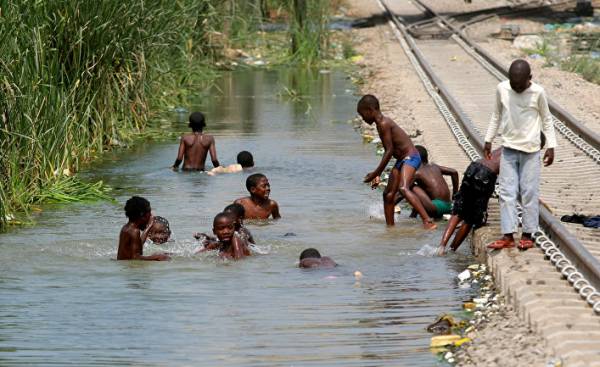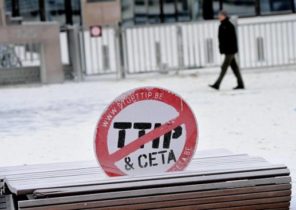
Since 2000, Chinese banks and businesses have allocated 77 billion euros to countries for China strategic importance.
“My train, my story”. New documentary aired on Chinese TV, it is an ode to Chinese investment in Africa. Two series of film dedicated to the new railway line was built in Kenya company China Road and Bridge Corporation. In these series, the Chinese touted the achievements of their engineers and talk about the government’s willingness to support the African continent on a path of growth.
This rhetoric is not new. The first railway line was built by China in Africa in 1975. It was connecting Tanzania with Zambia and then claimed to be the model of cooperation South-South. At that time the cost of the work amounted to 450 million euros and was financed by an interest-free loan of Beijing.
Forty years later the costs have increased significantly. The construction may 31 open line from Nairobi to Mombasa at a cost of 3.2 billion euros. The amount four times higher than initial estimates and five times more than the construction of the same line in Europe. Its opening took place four months after the launch of the line Addis Ababa — Djibouti, which spent $ 4 billion, i.e. a quarter of the national budget of Ethiopia.
Alarm
Debt repayment will be very difficult even on concessional terms. Since 2000, the government of China, its banks and businesses have provided Africa 77 billion euros. Most of these loans are provided by the supply of raw materials, whose prices are falling all the time. Almost all of Angolan oil goes to China pay off the debt at $ 20 billion. The state coffers are empty and Angola is on the verge of bankruptcy.
The IMF predicts growth of 2.6% in 2017 and 3.5% in 2018 in Black Africa. After a disastrous 2016 growth can start in Nigeria and South Africa, and it will remain below 1 % of economists believe the IMF and the world Bank. They fear increased public debt and inflation.
Under such conditions African countries will be able to repay the debts? The world Bank has sounded the alarm, considering the cost of Chinese investment in African infrastructure is too high. In Kenya, for example, China Exim Bank has financed 90% of the work without the tender announcement, while China is already the largest lender to Kenya and owns half of the external debt of this country.
To surrender to the Chinese economy
The government of Kenya claims that the new railway line will increase the growth of half a per cent and thus the country will be able to repay the debt only for four years. “It’s a lie,” – says Kwame Owino (Kwame Owino), Director of the Institute of Economics in Nairobi. He recalled that over the past three years, the debt had tripled: “the government will have no choice but to raise taxes.”
It would surely be more appropriate to upgrade the old line, built in 1896. “We should wonder why our government is so bad at negotiating,” — says Kwame Owino. Already on the way new projects: the rift Naivasha(Rift Valley-Naivasha), which will cost $ 1.5 billion Naivasha-Kisumu (Naivasha – Kisumu) near the border of Uganda, which will cost $ 3.5 billion.
In Central Africa, pouring billions, and China manipulates. African banks are rich and can at any time be required to repay the debt or, conversely, to facilitate payments. A country like South Africa is in the grip of the Chinese economy.
“Pressure on African countries is very high,” confirms Carlos Casanova (Carlos Casanova), chief economist at credit insurer Coface in Hong Kong. “I’m very pessimistic forecasts for Mozambique, have experienced a default in 2017, South Africa, which is very dependent on China, Zambia and Angola. From Kenya there is an advantage, as it is part of the Chinese project silk road and the project enjoys virtually unlimited credit.”
“Not angel, not demon”
“For anybody not a secret that China has big plans for Africa,” says Howard French (Howard French), author of “the Second continent of China. How a million migrants are building a new Empire in Africa”. “But the Chinese government is no longer the main element of this phenomenon. If you look at the situation from an objective point of view, China is a source of huge opportunities for African countries. You cannot see things from one point of view: China is not an angel and not a demon for Africa”.
If you compare the Chinese and American investments, we will see that the Americans are investing 66% in mining and oil, and the Chinese 28%. Ethiopia and Kenya, who are more likely to benefit from Chinese credits, not rich in raw materials. Ethiopia receives two times more loans than the Sudan. Thus, the issue is not that Chinese investments are motivated in natural resources, and how to dispose of this manna from heaven.
“Having such a strong economy with such high growth, which is widely investing in big projects can help Africa only on the condition that she will invest in well-governed and stable country. Need to have African governments learned how to pronounce these investments,” says Howard French.
“But I don’t think China will turn away from Africa. From a strategic point of view, China will still need to import raw materials and agricultural products or meat. But the intensity of trade may decline. Investing in the future, China will pay more attention to commercial benefits”, concludes Carlos Casanova, hoping that Africa will be able to benefit from his good relations with Chinese banks.







